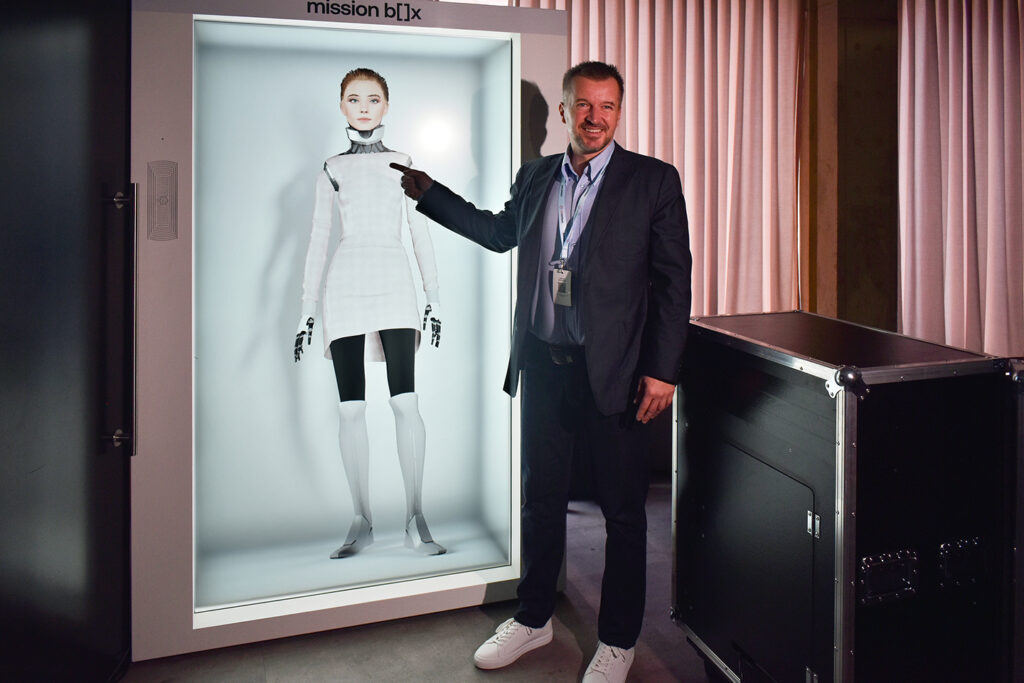Humanoid AI receptionist, based on artificial intelligence (AI), could revolutionise the hospitality industry and help preserve service quality at a time of hotel staff shortages across Europe.

Hotels in Europe face many challenges, the biggest of which is the lack of qualified staff. It is in this situation that BE-A is emerging on the market as the perfect virtual receptionist. BE-A was presented at the AI HotSpot conference by Filip Linek, owner of the PECR hotel complex in Pec pod Sněžkou (CZ) and founder of the startup FLÆ Robotics, together with Petr Paschenko, Head of Data Science at Profinit, which is involved in its development.
Staff shortages threaten quality of service
The hotel industry is facing a shortage of qualified staff. Europe’s hotels currently employ more than five million staff, with 83% of hotels citing staff shortages as the biggest threat to their operations. Filip Linek, entrepreneur and owner of a hotel complex in Pec pod Sněžkou, confirms that the situation is critical: “We are hiring practically everyone who applies for an interview, if they come at all.”
Lack of staff affects not only the quality of service but also the overall guest experience. According to statistics, the hotel industry is growing at twice the rate of global GDP, which only adds to the pressure to find innovative solutions. Hotels thus face a fundamental question: How to meet this challenge and maintain high standards of hospitality?
Two types of automation
One possible solution is automation in the form of kiosks, where guests themselves enter their requests. “A hotel without personal interaction may be acceptable for business travellers, but certainly not for those who want to experience the hospitality and care of the staff,” says Filip Linek. He says guests expect a personal touch and individual care that cannot be fully replaced by automated machines.
The BE-A virtual receptionist responds to this challenge. It is not an ordinary AI assistant, but a fully autonomous AI agent that handles all receptionist tasks. “BE-A is designed to be charming, always ready to help and completely reliable,” describes Linek. From booking rooms to scheduling wellness activities to communicating with guests.
AI receptionist BE-A: Revolution in hospitality
Thanks to AI, BE-A is able to provide the highest level of service while taking some of the burden off existing staff. A personalised approach, quick response to guest requests, mastery of countless languages and around-the-clock availability are just some of its key features that make it the ideal “employee” for hotels around the world.
“For us developers, inventing large language models was like inventing the combustion engine a hundred years ago,” says Petr Pashchenko. The virtual receptionist is designed to relieve staff of routine tasks and ensure the hotel runs flawlessly.
FLÆ Robotics’ ambition is to create a wider range of humanoid workers to help hotels and other industries address labour shortages. Next up could be customer service workers, for example, or even assistants at conference centres. Link says the idea is for technology to enrich the guest experience while giving businesses the tools to operate more efficiently.
3 modes of operation
BE-A is based on large language models that form its core. It is connected to hotel systems via APIs, allowing it to efficiently handle tasks such as reservations, guest communication and hotel service management.
A key feature of the BE-A is its ability to adapt to the current needs of the hotel thanks to its three modes of operation: manual, semi-automatic and automatic. In manual mode, a human performs all tasks and the BE-A simply monitors and learns. In semi-automatic mode, the BE-A suggests responses and plans actions, which the human modifies and approves.
Once the hotel staff determines that the BE-A handles certain activities flawlessly, they switch it to fully automatic mode, where the BE-A operates autonomously and reliably performs the tasks at hand. With this flexibility, hotels can gradually optimize their BE-A deployment and ensure a smooth transition to process automation.
Reaction within 1 minute
The developers behind BE-A technology, Profinit, test virtual receptionists daily. One of the main goals is to ensure that BE-A can not only communicate effectively, but also learn from each interaction and adapt its behaviour to the preferences of individual customers. BE-A operates under the supervision of experienced receptionists who monitor the quality of its responses. “BE-A learns very well, and as a result, receptionists already only need to correct a minimum of her answers,” adds Filip Linek.
BE-A is already answering guest queries at hotels in Pec pod Sněžkou. Pilot testing has shown that the average response time to guest queries has dropped from several hours to one minute. Guests are delighted with the speed and responsiveness, bringing hotels higher customer satisfaction and positive feedback, and thereby attracting more guests.
FLÆ Robotics plans that by 2026, BE-A will be available not only as a text and voice service, but also as a physical humanoid robot.
Author: Michal Roskanin